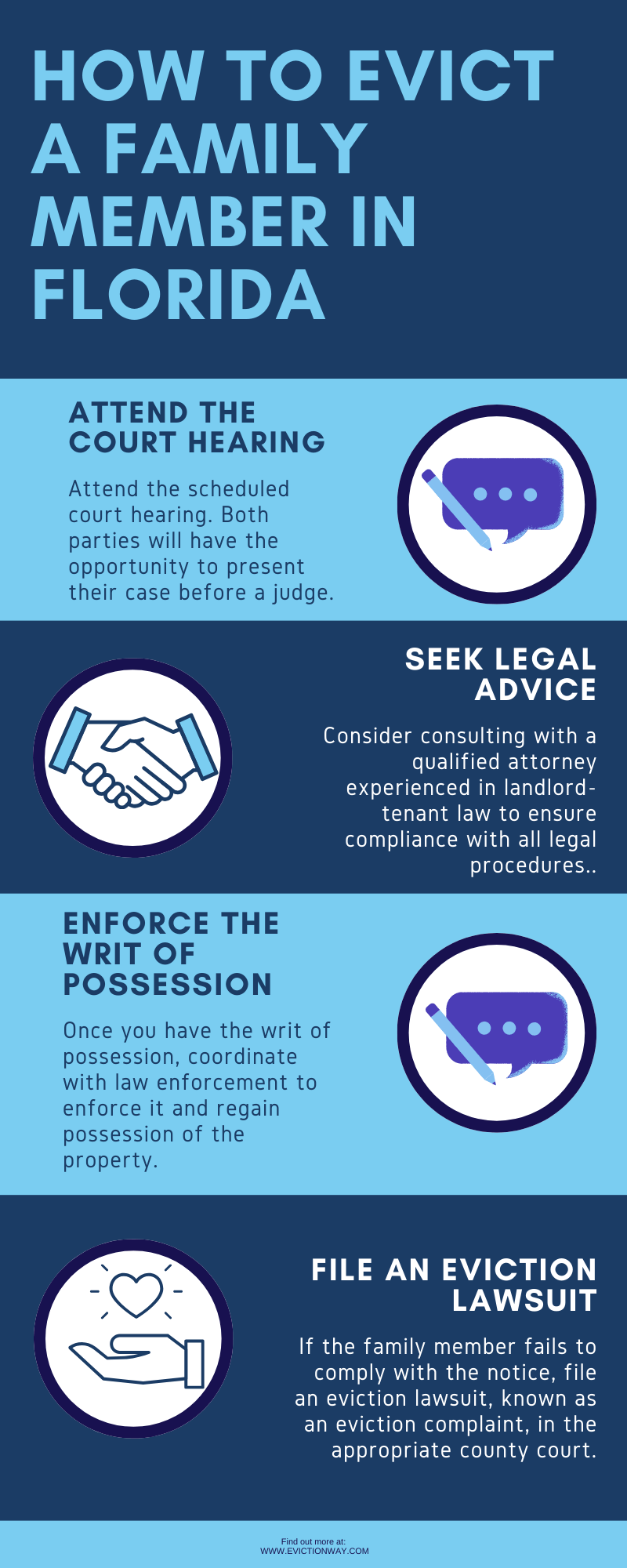Evicting a family member can be a difficult and emotional process, but it may be necessary to protect your rights and property. If you’re facing this situation in Florida, you’ll need to understand the legal process and your options.
In this article, we’ll guide you through the steps involved in evicting a family member in Florida. We’ll explain the legal requirements, provide tips on how to do it respectfully, and discuss the potential consequences.
We’ll also share some legal tips and resources to help you navigate this challenging situation. Whether you’re dealing with a difficult family member or simply need to enforce your property rights, this article will provide you with the information and support you need.

How To Evict a Family Member In Florida
Evicting a family member can be a difficult and emotional process, but it is sometimes necessary to protect your rights and property. If you are considering evicting a family member in Florida, it is important to understand the legal process and your rights as a landlord.
1. Determine if You Have Grounds for Eviction
In Florida, there are several grounds for eviction, including:
- Nonpayment of rent
- Violation of the lease agreement
- Criminal activity
- Damage to the property
- Nuisance behavior
If you believe that your family member has violated any of these grounds, you can begin the eviction process.
2. Give Proper Notice
Before you can evict your family member, you must give them proper notice. The notice period will vary depending on the grounds for eviction. For example, if you are evicting your family member for nonpayment of rent, you must give them a three-day notice to pay or vacate.
3. File an Eviction Lawsuit
If your family member does not vacate the property after receiving the notice, you will need to file an eviction lawsuit. The lawsuit must be filed in the county where the property is located.

4. Attend the Eviction Hearing
Once you have filed the lawsuit, you will need to attend an eviction hearing. At the hearing, you will present your evidence to the judge. The judge will then decide whether or not to grant the eviction.
5. Obtain a Writ of Possession
If the judge grants the eviction, you will be issued a writ of possession. The writ of possession gives the sheriff the authority to remove your family member from the property.
6. Enforce the Writ of Possession
Once you have obtained the writ of possession, you can contact the sheriff to enforce it. The sheriff will then remove your family member from the property.
Evicting a family member can be a difficult process, but it is important to remember that you have rights as a landlord. If you are considering evicting a family member, it is important to seek legal advice to ensure that you are following the proper procedures.
Additional Resources for Florida eviction help:
3 days eviction notice Florida
In Florida, a 3-day eviction notice indeed serves as a legal document that landlords can utilize when tenants breach their lease agreements.
This notice essentially notifies tenants that they have three days to rectify the violation or vacate the premises. It’s a crucial step in the eviction process and provides tenants with a final opportunity to resolve the issue before further legal action is taken.
You can download 3 day eviction notice Florida here.
15 days eviction notice Florida
In Florida, a 15-day notice to quit for non-payment of rent is a document used by landlords to inform tenants they’ve missed rent. It gives the tenant 15 days from the date they receive the notice to do one of two things:
- Pay the rent in full
- Vacate the property
If the tenant doesn’t comply within the 15 days, the landlord can then proceed with filing an eviction lawsuit in court.
You can download 15 day eviction notice Florida here.
How Much Does it Cost to Evict a Family Member in Florida?
Evicting a family member from your home in Florida can be a difficult and expensive process. The cost of eviction will vary depending on the specific circumstances of your case, but you can expect to pay several hundred dollars in court costs and attorney fees.
| Cost Type | Estimated Cost Range | Notes |
|---|---|---|
| Filing Fee | $185 – $400 | Varies by county |
| Service of Process | $10 – $50 per individual | Costs for delivering legal documents to the tenant |
| Attorney Fees | $500 – $5,000+ | Optional; varies greatly depending on the complexity of case |
| Lost Rent | Dependent on rental income | Opportunity cost until the eviction is complete |
| Additional Legal Expenses | Varies | Potential costs for motions, hearings, and additional filings |
If you are considering evicting a family member, it is important to weigh the costs and benefits carefully. Eviction is a serious legal process that can have a lasting impact on your relationship with your family member. If you are not sure whether eviction is the right option for you, it is important to seek legal advice.

FAQs: Evicting a Family Member in Florida
Here are some of the most frequently asked questions about evicting a family member in the Florida:
1. What legal grounds can I use to evict a family member in Florida?
In Florida, you can evict a family member if they have violated the terms of their tenancy, such as by not paying rent or breaking the lease agreement. You can also evict a family member if they are causing a nuisance or posing a threat to your safety or the safety of others.
2. What is the process for evicting a family member in Florida?
The process for evicting a family member in Florida is similar to the process for evicting any other tenant. You must first give the family member a written notice to vacate the premises. If the family member does not vacate the premises within the time specified in the notice, you can file an eviction lawsuit with the court.
3. How much time does it usually take to complete an eviction in Florida?
The eviction process in Florida usually takes around seven to fifteen weeks from filing to completion, but it can vary based on factors like court schedules and tenant response.
4. Can I evict a family member who is not on the lease?
Yes, you can evict a family member who is not on the lease. However, you must be able to prove that the family member is a tenant. This can be done by showing that the family member has been living in the premises for a period of time and has been paying rent.

5. What are some of the defenses that a family member can raise in an eviction lawsuit?
A family member may raise a number of defenses in an eviction lawsuit, such as:
- They are not a tenant
- They have not violated the terms of their tenancy
- They have a valid lease that prevents you from evicting them
- You are evicting them in retaliation for exercising their legal rights
6. What should I do if I am being evicted by a family member?
If you are being evicted by a family member, you should seek legal advice immediately. An attorney can help you understand your rights and options and can represent you in court.
Related:

Can i evict a family member without a written rental agreement in Florida?
No, In Florida, without a written rental agreement you typically can’t evict a family member without following legal procedures. You may need to provide three or fifteen days written notice and follow state eviction laws.